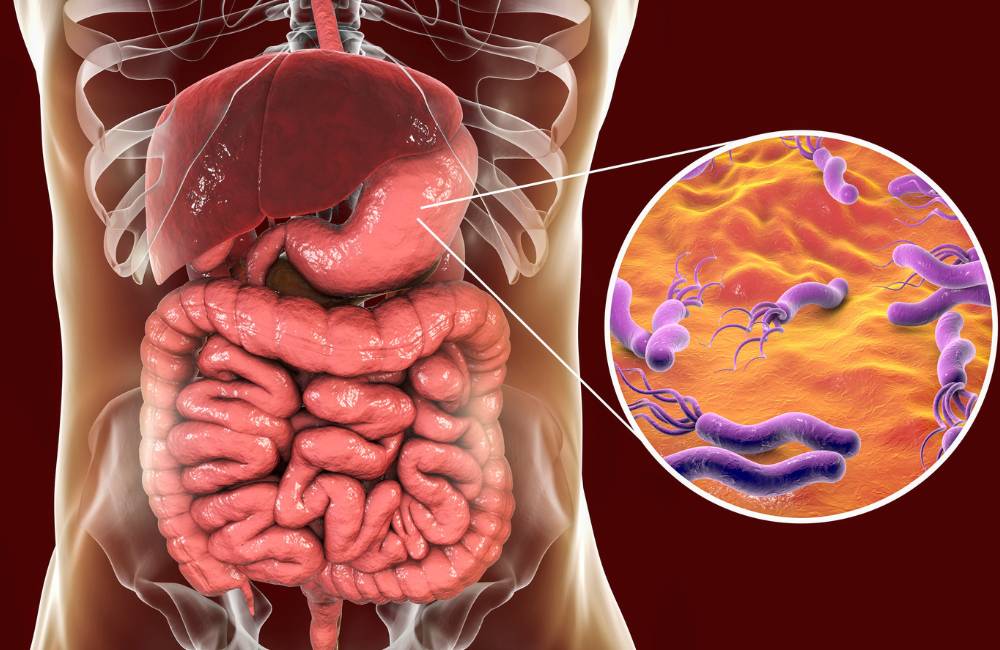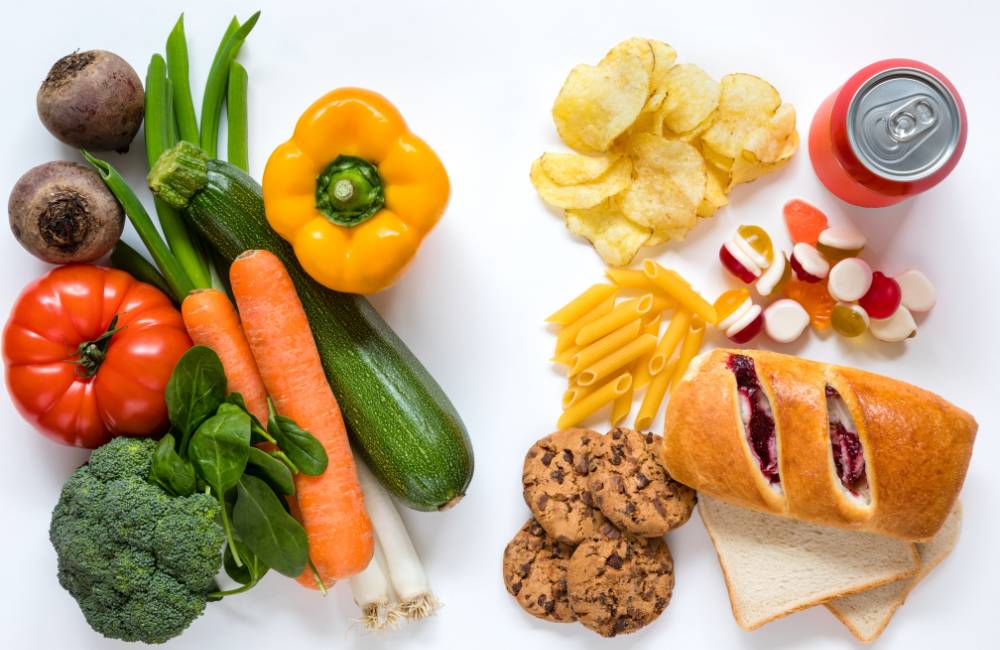Do you suffer from H. Pylori, the bacteria that cause stomach ulcers?
If so, you may be aware of the foods that can trigger or worsen your symptoms. But do you know which foods you should avoid to prevent flare-ups?
Here, we’ll provide you with the answer: list of foods known to trigger H. Pylori symptoms and tips on how to replace them with healthier alternatives.
By knowing what foods not to eat with H. Pylori and what to eat and drink instead, you can take charge of your health and reduce your risk of flare-ups.
So, let’s get started!

Table of Contents
What is H. Pylori?
H. pylori, short for Helicobacter pylori, is a bacterium that lives in humans’ stomachs and small intestines.
About half of the world’s population is infected with H pylori. There have been reports of this bacterium causing gastritis (inflammation of the stomach lining), peptic ulcer disease (sores in the lining of the stomach or duodenum), and even gastric cancer. Two Australian scientists, Barry Marshall, and Robin Warren, won the Nobel Prize for discovering it.
Interestingly, H. Pylori infections are most commonly seen in developing countries with overcrowded conditions and poor sanitation. Yet, nearly two-thirds of the world’s population could be diagnosed with this bacteria. Thankfully, if you do experience any problems, medications are available to destroy H. Pylori bacteria and speed the healing process.
How does H. Pylori affect the body?
To understand how these bacteria affect your body, let’s start with how your stomach works.
When you eat food, your stomach produces acid to break it down. Fortunately, the stomach has a lining that protects you from this acid. However, H. pylori, a type of bacterium, thrives in the mucus layer of the duodenum and stomach lining, where it can turn urea into ammonia using the enzyme urease. This clever tactic shields the bacteria from stomach acid. But when the bacteria damage the lining enough, the acid is no longer kept at bay. This can result in the development of peptic ulcers, which can cause bleeding, infections, or even blockages in your digestive system.
So how do you get H. pylori? You can acquire it from contaminated food, water, or utensils. It is also possible to get the bacteria from an infected person’s saliva or other bodily fluids. Notably, H. pylori thrive in areas lacking good sewage and water systems.
The symptoms
-
- Stomach pain at night or after eating
- Weight loss and loss of appetite
- Indigestion
- Bloating and burping
- Nausea or vomiting
- Stools that are dark due to blood
- Breath tests, stool tests, and endoscopies are used for diagnosis.
What’s the treatment for helicobacter pylori infection?
The treatment typically involves a combination of antibiotics and acid-reducing medications. While antibiotic treatment kills the bacteria, acid-reducing medications protect the stomach lining from further damage. The specific antibiotics used will depend on factors such as the severity of the infection, any allergies or medical conditions you may have, and whether any antibiotic-resistant strains are present.
Together with medication, lifestyle changes can also help combat H. pylori infection.

What should I not eat with H. pylori?
It’s essential to steer clear of types of foods that stimulate the production of digestive acids or irritate the stomach lining. Here’s a rundown of what to avoid – we’ve covered you with healthier substitutes.
1. Soft Drinks
These fizzy beverages can cause your stomach to bloat, lead to painful acid reflux, and generally wreak havoc on your digestive system. Luckily, there are plenty of alternatives that won’t worsen your symptoms.
Stay away from:
- Carbonated drinks
- Sparkling water
- Mineral water
Opt for:
- Flat water
- Herbal tea
2. Alcohol
Drinking up might be tempting, but it’s not worth the risk. Alcohol can not only exacerbate your stomach inflammation, but it can also make it worse. If you’re already fighting an infection, give your stomach a break and avoid heavy drinks.
Try instead:
- Fresh fruit juices
- Herbal tea
- Smoothies with skim milk
3. Dairy
Lactose in dairy products can be difficult to digest for those with H pylori. Undigested lactose can cause discomfort, such as bloating and cramps. Dairy products can also kick acid production into high gear, worsening any existing gastric issues caused by the bacteria.
Some studies have also suggested that dairy products can interfere with antibiotic effectiveness during H pylori treatment.
Opt for:
- Low-fat cheese
- Yogurts
- Milk
- Kefir
Stay away from:
- Processed milk products
- Yellow cheese
- Butter
- Heavy cream
4. Caffeine
Coffee is known to increase stomach acid production, exacerbating ulcer symptoms. This can also stimulate your stomach’s movement, which is not ideal when you have an infection.
Stay away from:
-
- Coffee
- Black tea
- Chocolate
- Energy drinks
5. Fruits & Vegetables
Even though most fruits and vegetables are healthy and nutritional, some may actually worsen your condition. Choose high-fiber options to improve your health and alleviate discomfort.
Eat plenty of:
- Green leafy vegetables
- Cranberries
- Blueberries
- Broccoli
- Cabbage
- Cauliflower
- Fresh fruits
Stay away from:
- Tangerines
- Pineapples
- Lemon
- Oranges
6. Low-fiber grains
Diets high in fiber can reduce your ulcer risk and speed up your recovery. Compared to whole grains, refined grains have less fiber. Ensure you get enough fiber by replacing refined grains with whole grains, like brown rice, oatmeal, etc.
Stay away from:
- White rice
- White flour
- Pasta
- Noodles
- White bread
Opt for:
- Whole grains
- Broken wheat
- Brown rice
- Oatmeal
7. Spicy foods
The fiery heat from spicy foods is known to trigger symptoms and intensify pain, which you surely wouldn’t want. Instead, opt for subtle spices, or better yet, avoid them altogether. Stick to bland foods until your treatment period ends and your stomach feels better.
Stay away from:
- Red chili peppers
- Pepper
- Garlic
- Mustard
- Chili
- Jalapeno
8. Pickle
While they may be delicious, pickles are acidic and spicy, two qualities that can wreak havoc on a sensitive stomach. Moreover, pickled foods contain vinegar which can be uncomfortable for your stomach lining.
9. Carbs
High-carb meals are not recommended for this condition. However, removing carbs altogether can be challenging. The solution? Cut down on carbs that can be easily eliminated. Conversely, increasing fiber intake helps reduce H pylori growth.
Stay away from:
- Sweets
- Bread
- Processed food
- Soda
- Potato chips, etc
Opt for:
- Lean protein
- Fibrous vegetables
- Low carb alternatives
10. Highly Processed foods
Processed foods often contain preservatives and additives that aggravate the stomach and intestines, leading to inflammation and discomfort. Cut out these foods to better manage your H. pylori symptoms.
Stay away from:
- Ready-to-eat foods
- Potato chips
- Bakery products like cakes
- Fast food
- Sugary drinks
- Processed meats
- Frozen food
- Canned food
11. Fatty and Fried foods
Fatty foods prolong your stomach’s emptying process and can increase acid production, which only exacerbates your condition. Moreover, eating a diet high in fat can cause more inflammation in your stomach lining, so watch out.
Some foods to avoid:
- Red meat
- Fried snacks
- Yellow cheese
- Heavy cream
- Butter
Incorporate low/good fat food such as:
- Fish oil
- Olive oil
- White meat
- Fish
12. Cigarettes
Smokers are more likely to develop the infection, possibly because smoking damages your stomach mucus lining, allowing bacteria to get in. Moreover, smoking weakens the immune system, making it harder to fight off H. pylori. Recovery may also take longer if you already have an infection.
13. Pain medications
NSAIDs (non-steroidal anti-inflammatory drugs) like aspirin, ibuprofen, and naproxen have been linked with increased H. pylori infection risk. As NSAIDs inhibit prostaglandins – hormone-like substances that heal ulcers and protect the stomach lining from acid damage, they work. As NSAID use decreases prostaglandin levels, the stomach becomes more susceptible to bacteria. Avoid these medications if you want your gut lining to fight H. pylori.
What foods help to heal H. Pylori?
You will still have to take the medicines your doctor prescribes, but certain superfoods can help you along the way.
Broccoli: The isothiocyanates found in broccoli sprouts exhibit anti-cancer properties and inhibit the growth of this bacteria. Besides broccoli, you can eat vegetables such as Bok Choy, cabbage, cauliflower, Brussels sprouts, ale, radishes, and turnips to help heal H. Pylori.
Black cumin seed: It’s packed with thymoquinone, a compound that has been scientifically proven to fight off various diseases. There is evidence that black cumin seed oil can improve conditions caused by H. Pylori, performing similarly to popular acid-blocking drugs like omeprazole.
Fresh turmeric: Rich in antioxidants and anti-inflammatory properties, turmeric is a go-to natural remedy. By inhibiting the pro-inflammatory cox–2 pathways in your body, it’s been scientifically shown to repair some of the damage done by Helicobacter.
Cranberry juice:
- Keeps bacteria off gastric mucus
- Blocks formation of biofilm
- Antioxidant and anticarcinogen
- Reduction of bacteria multiplication
- Germ-killing properties
Raspberry, blackberry, and strawberry, among other berries, can suppress H. Pylori.
Probiotics:
- Antibacterial
- Improves immune response
- Contains lactic acid, a gut-friendly antibacterial enzyme
You can consume probiotics through foods like yogurt, kefir, kombucha, and miso.
Healthy oils: Omega-3, olive oil, black currant seed oil, grapefruit seed oil, and more contain powerful anti-inflammatory properties that heal the stomach lining.
Vitamin C: This vitamin boosts stomach acidity and stimulates mucus production, preventing H. Pylori colonization. Feast on scrumptious veggies like broccoli, Brussels sprouts, cauliflower, spinach, cabbage, leafy greens, and tomatoes. Avoid sour foods like oranges and lemons that can aggravate your stomach further.
Zinc: The level of inflammation caused by the infection is linked to the amount of zinc in the stomach mucus. Adding zinc-rich foods to your diet can help ease the discomfort caused by H. Pylori. So, start snacking on spinach, mushrooms, broccoli, kale, lentils, beans, whole grains, nuts, and more to help avoid complications.
Ginger: The phenolic fractions in the ginger act as a protective layer against bacterial growth. The root’s antioxidant properties help scavenge free radicals, boost power, protect DNA, and prevent lipid breakdown.
Fiber-rich foods:
- Reduces stomach acid production
- Boosts digestion and reduces bloating
- Relieves the pain of an infection
- Prevents ulcers
Manuka honey: While it may not completely destroy the bacteria on its own, it has been shown to help hamper its growth in the gut. Plus, it’s effective when combined with antibiotics.
What should I drink if I have H. Pylori?
- Drinks containing probiotics, like kefir and Yakult
- Reduces gut inflammation with green tea
- Berry juices like cranberry, blueberry, strawberry, etc.
- Fruit and veggie juices
- Fruit smoothies with skim milk and berries
The bottom line
You should avoid these foods not to eat with H. Pylori. This pesky gut bacterium can cause serious troubles, so it’s best to take preventive measures. However, if you do become infected, it’s essential to avoid certain foods and beverages is essential. Moreover, incorporating certain foods into your diet can aid your treatment. Remember, though, that these foods are supplemental and should be used in conjunction with the treatment recommended by a medical professional.